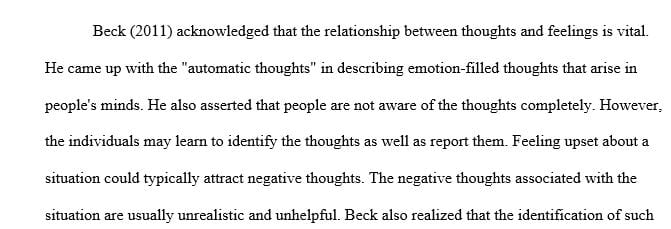Imagine that you receive a poor grade on an assignment. What thoughts would automatically enter your head
Imagine that you receive a poor grade on an assignment. What thoughts would automatically enter your head? Would you try to explain the situation through factors such as the teacher’s grading style or a minor personal emergency that you were having that week? Would your thoughts be relatively positive and encouraging for next time or negative and self-defeating? Would you have evidence to support your thoughts or a way to prove they were correct?
For this Assignment, you are asked to think of your own frustrating fictitious situation and keep a log of the thoughts that might enter your head if the situation were real. In CBT, this log is called an Automatic Thought Record, and it is a very common homework strategy assigned to clients by CBT therapists. This assignment reinforces Beck’s notion that humans have automatic thoughts that come into their minds and that by tracking them, a client could begin to quantify the number of negative thoughts they have.
To prepare:
Review this week’s Learning Resources on automatic thoughts.
Review the Automatic Thought Record Template found in the Learning Resources.
Consider a fictitious situation in which you feel frustration or disappointment. For example, getting a poor grade, getting a parking ticket, losing a competition, etc.
Record the thoughts you have about the situation, pretending that it were real. What are you saying to yourself?
For this Assignment:
Briefly describe your fictitious situation.
Based on the fictitious situation you created, complete the Automatic Thought Record Template.
Use your Learning Resources to support your findings. Use proper APA format and citations.
Readings
Beck, J. (2011). Cognitive behavior therapy: Basics and beyond (2nd ed.). New York, NY: Guilford Press.
Chapter 9: “Identifying Automatic Thoughts” (pp. 137–157)
Becker, I. M., & Rosenfeld, J. G. (1976). Rational emotive therapy-a study of initial therapy sessions of Albert Ellis. Journal of Clinical Psychology, 32(4), 872–876.
Note: You will access this article from the Walden Library databases.
Beck, J. (2011). Annual Reviews Conversations presents a conversation with Aaron T. Beck. Annual Reviews Conversations. Retrieved from http://www.annualreviews.org/userimages/ContentEdi…
A Conversation with Aaron T. Beck by Beck, J., in Annual Reviews Conversations. Copyright 2011 by Annual Reviews, Inc. Reprinted by permission of Annual Reviews, Inc. via the Copyright Clearance Center.
DeRubeis, R. J., Webb, C. A., Tang, T. Z., & Beck, A. T. (2010). Cognitive therapy. In K. S. Dobson (Ed.), Handbook of cognitive behavioral therapies (3rd ed.) (pp. 277-316). New York, NY: Guilford Press.
Answer preview to imagine that you receive a poor grade on an assignment. What thoughts would automatically enter your head
APA
1002 words


